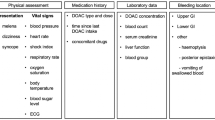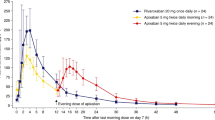Abstract
Background
Systemic anticoagulants are widely prescribed for prevention and treatment of thromboembolism, but are commonly complicated by gastrointestinal bleeding (GIB). Limited data exist on the management of anticoagulation after hospitalization for GIB and the subsequent risks of recurrent GIB, thromboembolism, and mortality.
Methods
We performed a systematic review and meta-analysis of studies to determine risk of recurrent GIB, thromboembolism, and mortality after resuming anticoagulation following GIB. PubMed, EMBASE, and Scopus were searched for randomized controlled trials and cohort studies in patients with atrial fibrillation, venous thromboembolism, or valvular heart disease who received long-term warfarin or direct oral anticoagulants before experiencing GIB. Studies were included if data were available on anticoagulation management and outcomes of recurrent GIB, thromboembolism, and mortality following GIB.
Results
A total of 5354 studies were reviewed of which 10 were included in the meta-analysis. There were 2080 patients who resumed anticoagulation and 2296 patients who discontinued anticoagulation post-index GIB. Resumption of anticoagulation was associated with a significant increase in recurrent GIB (OR 1.646, 95% CI 1.035–2.617, p = 0.035). There was a significant decrease in thromboembolic events in patients who resumed anticoagulation compared to those who did not (OR 0.340, 95% CI 0.178–0.652, p = 0.001, I2 = 62.7%). Resumption of anticoagulation was associated with a significant reduction in all-cause mortality (OR 0.499, 95% CI 0.419–0.595, p < 0.0001).
Conclusion
While resumption of anticoagulation following index GIB was associated with a significant increase in recurrent GIB, it was also associated with a significant decrease in thromboembolic events and all-cause mortality.



Similar content being viewed by others
References
Qureshi W, Mittal C, Patsias I, et al. Restarting anticoagulation and outcomes after major gastrointestinal bleeding in atrial fibrillation. Am J Cardiol. 2014;113:662–668. https://doi.org/10.1016/j.amjcard.2013.10.044.
Hylek EM, Evans-Molina C, Shea C, Henault LE, Regan S. Major hemorrhage and tolerability of warfarin in the first year of therapy among elderly patients with atrial fibrillation. Circulation. 2007;115:2689–2696. https://doi.org/10.1161/CIRCULATIONAHA.106.653048.
Hansen ML, Sorensen R, Clausen MT, et al. Risk of bleeding with single, dual, or triple therapy with warfarin, aspirin, and clopidogrel in patients with atrial fibrillation. Arch Intern Med. 2010;170:1433–1441. https://doi.org/10.1001/archinternmed.2010.271.
Horsley-silva NSA, Jennifer L. Gastrointestinal bleeding secondary to the new anticoagulants. Curr Opin Gastroenterol. 2017;32:474–480. https://doi.org/10.1097/MOG.0000000000000310.
Connolly SJ, Ezekowitz MD, Yusuf S, et al. Dabigatran versus warfarin in patients with atrial fibrillation. N Engl J Med. 2009;361:1139–1151. https://doi.org/10.1056/NEJMoa0905561.
Patel MR, Mahaffey KW, Garg J, et al. Rivaroxaban versus warfarin in nonvalvular atrial fibrillation. N Engl J Med. 2011;365:883–891. https://doi.org/10.1056/NEJMoa1009638.
Granger CB, Alexander JH, McMurray JJ, et al. Apixaban versus warfarin in patients with atrial fibrillation. N Engl J Med. 2011;365:981–992. https://doi.org/10.1056/NEJMoa1107039.
Giugliano RP, Ruff CT, Braunwald E, et al. Edoxaban versus warfarin in patients with atrial fibrillation. N Engl J Med. 2013;369:2093–2104. https://doi.org/10.1056/NEJMoa1310907.
Nieto JA, Camara T, Gonzalez-Higueras E, et al. Clinical outcome of patients with major bleeding after venous thromboembolism: findings from the RIETE registry. Thromb Haemost. 2008;100:789–796. https://doi.org/10.1160/TH08-06-0390.
Holbrook A, Schulman S, Witt DM, et al. Evidence-based management of anticoagulant therapy: antithrombotic therapy and prevention of thrombosis, 9th ed: American College of Chest Physicians Evidence-Based Clinical Practice Guidelines. Chest. 2012;141:e152S–e184S. https://doi.org/10.1378/chest.11-2295.
Sengupta N, Feuerstein JD, Patwardhan VR, et al. The risks of thromboembolism vs. recurrent gastrointestinal bleeding after interruption of systemic anticoagulation in hospitalized inpatients with gastrointestinal bleeding: a prospective study. Am J Gastroenterol. 2015;110:328–335. https://doi.org/10.1038/ajg.2014.398.
Witt DM, Delate T, Garcia DA, et al. Risk of thromboembolism, recurrent hemorrhage, and death after warfarin therapy interruption for gastrointestinal tract bleeding. Arch Intern Med. 2012;172:1484–1491. https://doi.org/10.1001/archinternmed.2012.4261.
Staerk L, Lip GY, Olesen JB, et al. Stroke and recurrent haemorrhage associated with antithrombotic treatment after gastrointestinal bleeding in patients with atrial fibrillation: nationwide cohort study. BMJ. 2015;351:h5876. https://doi.org/10.1136/bmj.h5876.
Chai-Adisaksopha C, Hillis C, Monreal M, Witt DM, Crowther M. Thromboembolic events, recurrent bleeding and mortality after resuming anticoagulant following gastrointestinal bleeding. A meta-analysis. Thromb Haemost. 2015;114:819–825. https://doi.org/10.1160/TH15-01-0063.
Little D, Chai-Adisaksopha C, Hillis C, et al. Resumption of anticoagulant therapy after anticoagulant-related gastrointestinal bleeding: a systematic review and meta-analysis. Thromb Res. 2019;175:102–109. https://doi.org/10.1016/j.thromres.2019.01.020.
Stroup DF, Berlin JA, Morton SC, et al. Meta-analysis of observational studies in epidemiology: a proposal for reporting. Meta-analysis Of Observational Studies in Epidemiology (MOOSE) group. Jama. 2000;283:2008–2012.
Al-Khalil O. Resumption of antithrombotic therapy after gastrointestinal bleeding. Praxis. 2016;105:287–288. https://doi.org/10.1024/1661-8157/a002280.
Belanova V, Griva M. Antithrombotic therapy and nonvariceal upper gastrointestinal bleeding. Vnitrni Lek. 2015;61:1016–1022.
Konturek P, Hess T. Gastrointestinal bleeding under treatment with new oral anticoagulants. MMW Fortschr der Med. 2014;156:50–52.
Lega JC, Bertoletti L, Durupt S, et al. New oral anticoagulants in nonvalvular atrial fibrillation. Presse Med (Paris, France: 1983). 2013;42:1225–1231. https://doi.org/10.1016/j.lpm.2013.06.004.
Pérez Aisa Á, Nuevo J, López Morante AA, et al. Current management of nonvariceal upper gastrointestinal bleeding in Spain. Gastroenterol Hepatol. 2012;35:468–475. https://doi.org/10.1016/j.gastrohep.2012.02.007.
Aoki T, Nagata N, Niikura R, et al. Recurrence and mortality among patients hospitalized for acute lower gastrointestinal bleeding. Clin Gastroenterol Hepatol Off Clin Pract J Am Gastroenterol Assoc. 2015;13:488–494. https://doi.org/10.1016/j.cgh.2014.06.023.
Berger R, Salhanick SD, Chase M, Ganetsky M. Hemorrhagic complications in emergency department patients who are receiving dabigatran compared with warfarin. Ann Emerg Med. 2013;61:475–479. https://doi.org/10.1016/j.annemergmed.2013.02.008.
Bor S, Dagli U, Sarer B, et al. A retrospective study demonstrating properties of nonvariceal upper gastrointestinal bleeding in Turkey. Turk J Gastroenterol Off J Turk Soc Gastroenterol. 2011;22:249–254.
Bucknall RC, Eastham RD. Haemorrhage complicating anticoagulant therapy. Bristol Med Chir J. 1975;90:57–60.
Deutsch GB, Kandel AR, Knobel D, et al. Bleeding risk secondary to deep vein thrombosis prophylaxis in patients with lower gastrointestinal bleeding. J Intensive Care Med. 2012;27:379–383. https://doi.org/10.1177/0885066611420339.
Hreinsson JP, Kalaitzakis E, Gudmundsson S, Bjornsson ES. Upper gastrointestinal bleeding: incidence, etiology and outcomes in a population-based setting. Scand J Gastroenterol. 2013;48:439–447. https://doi.org/10.3109/00365521.2012.763174.
Mungan Z. An observational European study on clinical outcomes associated with current management strategies for non-variceal upper gastrointestinal bleeding (ENERGIB-Turkey). Turk J Gastroenterol Off J Turk Soc Gastroenterol. 2012;23:463–477.
Telaku S, Kraja B, Qirjako G, Prifti S, Fejza H. Clinical outcomes of nonvariceal upper gastrointestinal bleeding in Kosova. Turk J Gastroenterol Off J Turk Soc Gastroenterol. 2014;25:110–115. https://doi.org/10.5152/tjg.2014.4351.
Abraham NS. Novel oral anticoagulants and gastrointestinal bleeding: a case for cardiogastroenterology. Clin Gastroenterol Hepatol Off Clin Pract J Am Gastroenterol Assoc. 2013;11:324–328. https://doi.org/10.1016/j.cgh.2012.12.013.
Barnes GD, Douketis JD. Restarting antithrombotics after GI bleeding was linked to better outcomes in patients with AF. Ann Intern Med. 2016;164:Jc33. https://doi.org/10.7326/acpjc-2016-164-6-033.
Beales IL. Decisions on restarting anticoagulation should be made earlier after rebleeding. BMJ (Clin Res Ed). 2016;532:i248. https://doi.org/10.1136/bmj.i248.
Borja J, Domenech A, Garcia-Rafanell J. Pharmacological therapies and major gastrointestinal bleeding in patients with atrial fibrillation. Int J Clin Pract. 2013;67:488. https://doi.org/10.1111/j.1742-1241.2012.02976.x.
Brotman DJ, Jaffer AK. Resuming anticoagulation in the first week following gastrointestinal tract hemorrhage: should we adopt a 4-day rule? Arch Intern Med. 2012;172:1492–1493. https://doi.org/10.1001/archinternmed.2012.4309.
Filion KB, Assayag J, Azoulay L. Resumption of warfarin therapy after gastrointestinal tract bleeding: benefit or bias? JAMA Intern Med. 2013;173:831–832. https://doi.org/10.1001/jamainternmed.2013.3763.
Witt DM, Delate T, Crowther MA. Resumption of warfarin therapy after gastrointestinal tract bleeding: benefit or bias? Reply. JAMA Intern Med. 2013;173:832–833. https://doi.org/10.1001/jamainternmed.2013.14.
Ahmed A, Stanley AJ. Acute upper gastrointestinal bleeding in the elderly: aetiology, diagnosis and treatment. Drugs Aging. 2012;29:933–940. https://doi.org/10.1007/s40266-012-0020-5.
Epple C, Steiner T. Recommendations for the management bleeding complications associates with oral anticoagulant therapy. Internist Praxis. 2014;54:841–852.
Fanikos JR, Atay JK, Connors JM. Improving anticoagulation management in patients with atrial fibrillation. Pharm Therap. 2013;38:173–177.
Kurien M, Lobo AJ. Acute upper gastrointestinal bleeding. Clin Med J R Coll Phys Lond. 2015;15:481–485. https://doi.org/10.7861/clinmedicine.15-5-481.
Marek TA. Gastrointestinal bleeding. Endoscopy. 2003;35:891–901. https://doi.org/10.1055/s-2003-43485.
Radaelli F, Dentali F, Repici A, et al. Management of anticoagulation in patients with acute gastrointestinal bleeding. Dig Liver Dis Off J Ital Soc Gastroenterol Ital Assoc Study Liver. 2015;47:621–627. https://doi.org/10.1016/j.dld.2015.03.029.
Almadi MA, Barkun A, Brophy J. Antiplatelet and anticoagulant therapy in patients with gastrointestinal bleeding: an 86-year-old woman with peptic ulcer disease. Jama. 2011;306:2367–2374. https://doi.org/10.1001/jama.2011.1653.
Stang A. Critical evaluation of the Newcastle-Ottawa scale for the assessment of the quality of nonrandomized studies in meta-analyses. Eur J Epidemiol. 2010;25:603–605. https://doi.org/10.1007/s10654-010-9491-z.
Chen WC, Chen YH, Hsu PI, et al. Gastrointestinal hemorrhage in warfarin anticoagulated patients: incidence, risk factor, management, and outcome. BioMed Res Int. 2014;. https://doi.org/10.1155/2014/463767.
Lee JK, Kang HW, Kim SG, Kim JS, Jung HC. Risks related with withholding and resuming anticoagulation in patients with non-variceal upper gastrointestinal bleeding while on warfarin therapy. Int J Clin Pract. 2012;66:64–68. https://doi.org/10.1111/j.1742-1241.2011.02827.x.
Majeed A, Wallvik N, Eriksson J, et al. Optimal timing of vitamin K antagonist resumption after upper gastrointestinal bleeding. A risk modelling analysis. Thromb Haemost. 2017;117:491–499. https://doi.org/10.1160/TH16-07-0498.
Sengupta N, Marshall AL, Jones BA, Ham S, Tapper EB. Rebleeding vs thromboembolism after hospitalization for gastrointestinal bleeding in patients on direct oral anticoagulants. Clin Gastroenterol Hepatol. 2018;16:1893–1900. https://doi.org/10.1016/j.cgh.2018.05.005.
Siau K, Hannah JL, Hodson J, Widlak M, Bhala N, Iqbal TH. Stopping antithrombotic therapy after acute upper gastrointestinal bleeding is associated with reduced survival. Postgrad Med J. 2018;94:137–142. https://doi.org/10.1136/postgradmedj-2017-135276.
Patel P, Nigam N, Sengupta N. Resumption of Warfarin after hospitalization for lower gastrointestinal bleeding and mortality benefits. J Clin Gastroenterol. 2018;52:545–550. https://doi.org/10.1097/MCG.0000000000000821.
Strate LL, Gralnek IM. ACG clinical guideline: management of patients with acute lower gastrointestinal bleeding. Am J Gastroenterol. 2016;111:755. https://doi.org/10.1038/ajg.2016.155.
Funding
The authors report no financial or grant support for this project.
Author information
Authors and Affiliations
Contributions
Sengupta designed the study; Werner performed database searches; Tapaskar and Pang abstracted clinical data; Tapaskar and Pang conducted statistical analysis; Tapaskar, Pang, and Sengupta prepared the final version of the manuscript.
Corresponding author
Ethics declarations
Conflict of interest
The authors declare that they have no conflict of interest.
Additional information
Publisher's Note
Springer Nature remains neutral with regard to jurisdictional claims in published maps and institutional affiliations.
Electronic supplementary material
Below is the link to the electronic supplementary material.
Rights and permissions
About this article
Cite this article
Tapaskar, N., Pang, A., Werner, D.A. et al. Resuming Anticoagulation Following Hospitalization for Gastrointestinal Bleeding Is Associated with Reduced Thromboembolic Events and Improved Mortality: Results from a Systematic Review and Meta-Analysis. Dig Dis Sci 66, 554–566 (2021). https://doi.org/10.1007/s10620-020-06248-9
Received:
Accepted:
Published:
Issue Date:
DOI: https://doi.org/10.1007/s10620-020-06248-9




